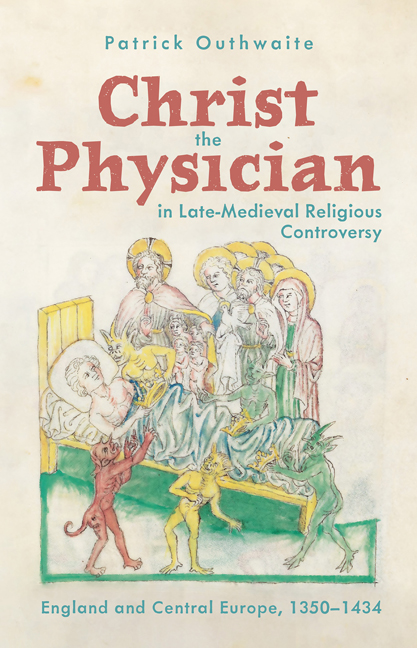Book contents
- Frontmatter
- Dedication
- Contents
- List of Illustrations
- Acknowledgements
- List of Abbreviations
- Introduction: The Christus medicus Tradition
- 1 The Virgin Mary as Nurse, Medicine and Mother: Devotional Texts and Hospitals
- 2 Sacramental Medicine and Frequent Communion from Prague to Kraków
- 3 Disenfranchised Surgeons: Christus chirurgus and Wycliffite Preaching in England
- 4 The Diseased Ecclesia from Jan Hus’s Exile to the Council of Basel
- 5 Responses to Heresy at the Councils of Constance and Basel
- Afterword
- Bibliography
- Index
- Miscellaneous Endmatter
2 - Sacramental Medicine and Frequent Communion from Prague to Kraków
Published online by Cambridge University Press: 09 May 2024
- Frontmatter
- Dedication
- Contents
- List of Illustrations
- Acknowledgements
- List of Abbreviations
- Introduction: The Christus medicus Tradition
- 1 The Virgin Mary as Nurse, Medicine and Mother: Devotional Texts and Hospitals
- 2 Sacramental Medicine and Frequent Communion from Prague to Kraków
- 3 Disenfranchised Surgeons: Christus chirurgus and Wycliffite Preaching in England
- 4 The Diseased Ecclesia from Jan Hus’s Exile to the Council of Basel
- 5 Responses to Heresy at the Councils of Constance and Basel
- Afterword
- Bibliography
- Index
- Miscellaneous Endmatter
Summary
The end of the De bono mortis, written by Jan of Jenštejn, archbishop of Prague, features the story of a wealthy woman named Elizabeth who suffered from convulsions that left her paralysed and unable to speak. Her illness began after she had stopped taking daily communion administered by her confessor Matthew of Krakow, master of the University of Prague. This was not the first time she had been ill in this manner, as Jenštejn explains:
When sometimes it so happened that she did not take communion, she soon started to weaken; and when at times three or four ailments befell her most severely, she began to mock them and make light of them on account of her tasting of the divine sweetnesses. At other times she was even cured of the most serious illnesses by her reception of the sacred Eucharist.
Physicians and members of the clergy failed to diagnose her illness and cure her, and it was only after she received communion that her great discomfort started to cease. However, this time, Elizabeth did not recover, but died, after directly interacting with Christ:
When this woman was shaken daily by many infirmities, she began at last to languish and to be weakened to death, and when she was unable to speak with the many priests and religious women who were standing by her in wonder, she signalled with her hands that they should withdraw from this side and that. No one understood how to help her, yet willing to obey, they withdrew to one part [of the room]. And when after a time she recovered enough strength that she might begin to speak, asked by the bystanders why she had motioned to them with her hands that they should withdraw to the side, she said, ‘Most delightful Jesus Christ, my Bridegroom visited me in his divine glory, I prepared the path.’ Telling of everything she saw with many very devout words, one moment she sighed, the next she exulted and at other times, put in a state of ecstasy, she was held suspended in the repose of divine pleasure.
- Type
- Chapter
- Information
- Christ the Physician in Late-Medieval Religious ControversyEngland and Central Europe, 1350-1434, pp. 67 - 112Publisher: Boydell & BrewerPrint publication year: 2024



